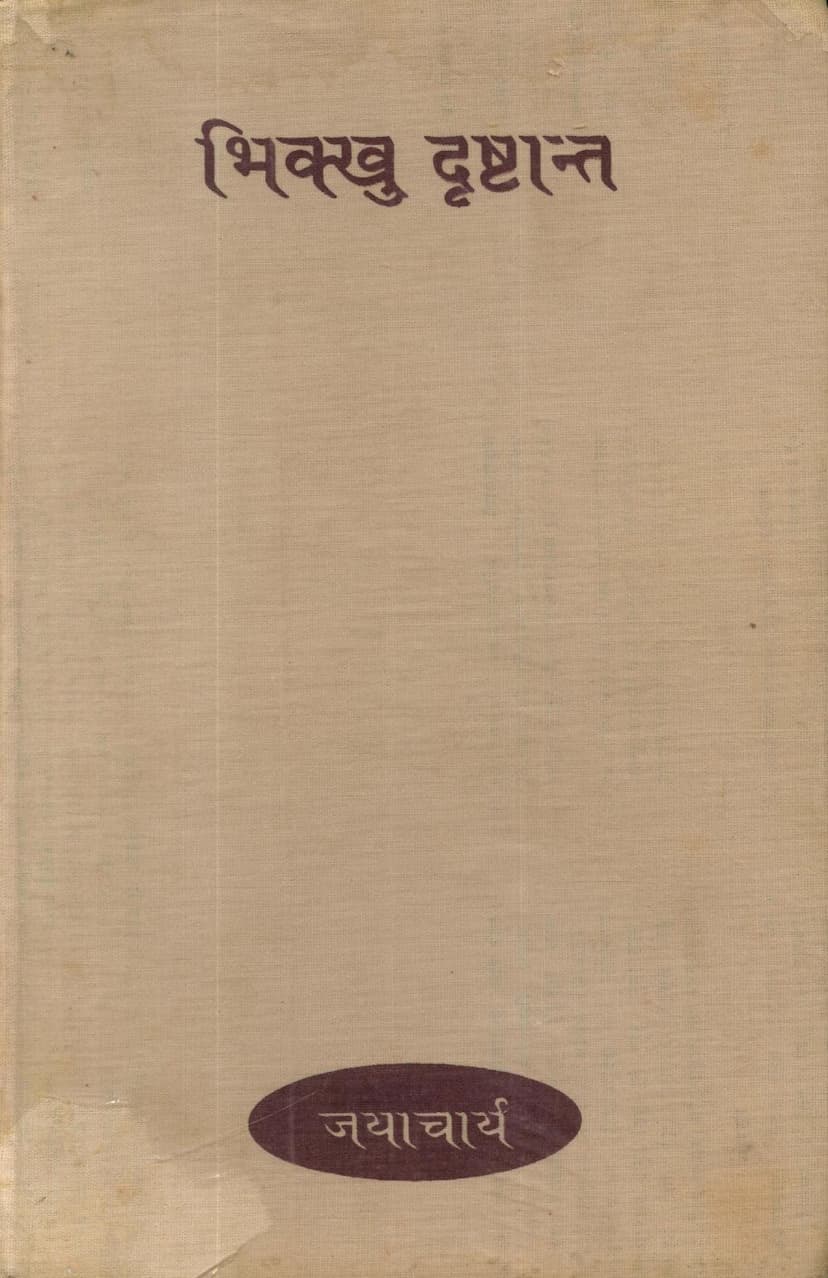Bhikkhu Drushtant
Added to library: September 1, 2025

Summary
This document is the third edition of "Bhikkhu Drushtant" (Illustrations of a Monk), compiled by Jayacharya and edited by Muni Madhukarmuni. Published by Jain Vishva Bharti, Ladnun, it is a collection of life incidents and anecdotes of Acharya Bhikshu, a prominent figure in the Terapanth Jain tradition. The book aims to present these instances in a simple, accessible language for everyone to understand the underlying message.
The publication acknowledges the guidance of Ganadhipati Pujya Gurudev Shri Tulsi and Acharya Shri Mahapragya. This third edition, released on June 17, 1994, builds upon the previous editions, including the first one in 1960, the second in 1987.
The "Prakashkiya" (Foreword) highlights "Bhikkhu Drushtant" as the eighth publication in the 'Terapanth's Rajasthani Literature' series. It emphasizes the efforts of Munishri Madhukarji in presenting the anecdotes in simple Hindi, making them accessible to all. The compilation is considered a significant contribution to Rajasthani literature and, by extension, world literature, given its relatively early composition in the tradition of memoir writing.
The "Purovak" (Introduction) provides detailed insights into the book's significance:
- Content: The book contains 312 life incidents of Acharya Bhikshu, recorded by Muni Hemrajji, a close disciple of Acharya Bhikshu. Acharya Jayacharya compiled these into a book format.
- Historical Value: It is considered a valuable historical document, offering a glimpse into the status of Jainism during Acharya Bhikshu's time, the lifestyle of monks and lay followers, and their conduct and thoughts. It authentically captures the essence of Acharya Bhikshu's life-long devotion.
- Acharya Bhikshu's Personality: The introduction elaborates on Acharya Bhikshu's profound theoretical knowledge, sharp intellect, logical reasoning, skillful debate, impactful preaching style, and strong disciplinary approach, all vividly illustrated through these anecdotes.
- Key Themes and Virtues: The text highlights Acharya Bhikshu's emphasis on:
- Simplicity and Purity: His life and teachings are described as pure and effortless.
- Insight over Intellect: His style of conveying his message directly touched the listener's heart, transcending mere intellect and leading to inner realization.
- Steadfastness: His unwavering commitment to righteousness and his courage in facing obstacles.
- Discipline and Compassion: His balanced approach with disciples, being firm when necessary and gentle at other times.
- Subtle Discrimination: His keen understanding of 'swa-samay' (one's own time/principles) and 'para-samay' (others' time/principles).
- Upholding Pure Conduct: His strong opposition to superficiality and mere outward appearance, advocating for genuine faith and conduct. He faced difficulties for this but never wavered.
- Ahimsa (Non-violence): His profound thoughts and reflections on ahimsa, embodying the principle of 'Atmanvat Sarvabhooteshu' (seeing all beings as oneself). He valued the life of even the smallest, single-sensed organisms as much as human life.
- Relevance of the Teachings: The anecdotes are presented as timeless, offering wisdom on various aspects of life, from distinguishing between books and knowledge, understanding organizational principles, and the concept of relativity (likened to Einstein's theory), to practical advice on managing wealth and understanding spiritual practices.
- Translations and Accessibility: Recognizing that Rajasthani may not be universally understood, the text mentions its translation into Hindi and emphasizes the need for translations into other Indian and international languages to make its profound wisdom accessible to a wider audience.
- Structure: The third edition includes five appendices: Hem Edition, Shravak Sansmaran (Lay Disciple Recollections), Futkar Sansmaran (Miscellaneous Recollections), Shabdanukram (Word Index), and Vishesh Shabdakosh (Special Glossary).
The book itself contains a rich collection of dialogues and incidents, presented as anecdotes. The content of these anecdotes covers a wide range of topics relevant to spiritual practice and ethical conduct in Jainism. The provided scanned pages list over 300 such anecdotes, with titles in Rajasthani and corresponding Hindi page numbers. These illustrate various ethical principles, philosophical concepts, and practical situations faced by Acharya Bhikshu and his followers, often highlighting the Acharya's wisdom, compassion, and unwavering adherence to Jain principles.
The provided text is primarily introductory and supplementary material, including the cover page, publisher information, foreword, introduction, and a detailed index of the anecdotes. It highlights the book's importance in preserving and disseminating the teachings and life examples of a significant Jain spiritual leader.